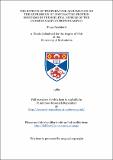Files in this item
The effects of temperature acclimation on the expression of contractile protein isoforms in the skeletal muscle of the common carp (Cyprinus carpio)
Item metadata
| dc.contributor.advisor | Johnston, Ian A. | |
| dc.contributor.author | Crockford, Tony | |
| dc.coverage.spatial | 180 p. | en_US |
| dc.date.accessioned | 2018-07-04T16:23:54Z | |
| dc.date.available | 2018-07-04T16:23:54Z | |
| dc.date.issued | 1989 | |
| dc.identifier.uri | https://hdl.handle.net/10023/14940 | |
| dc.description.abstract | Chapter 1. Part A reviews the current knowledge of temperature acclimation in teleost fish,with particular emphasis on skeletal muscle. There appear to be two types of response to low temperatures, dormancy or a homeostatic response. The homeostatic response serves to compensate for the reduced reaction rate usually seen at lower temperatures. In some species both responses occur depending on the water temperature. Part B reviews polymorphism in muscle proteins. All the myofibrillar proteins have been shown to exist as isoforms, which are differentially expressed in muscle types and with development. The isoforms expressed appear to be related to the contractile properties of the muscle. Chapter 2. The parvalbumin content, isoforms, and calcium binding characteristics were studied in the white muscle of 5° and 25° acclimated carp (Cyprinus carpio). The total parvalbumin concentration was 0.61-0.68mmols/kg wet weight. Two calcium binding sites per molecule and a dissociation constant of 2.1-2.4x10<super>-6</super> M were measured. No differences related to acclimation temperature were observed. Chapter 3. The myofibrillar ATPase from white muscle of 8° and 20°C acclimated carp (Cyprinus carpio) u/as shown to increase in cold-acclimated fish at both high and low assay temperatures. Electrophoretic analysis of the myofibrillar proteins showed a unique myosin light chain isoform to be present in cold-acclimated fish, and a unique troponin I isoform to be present in warm acclimated fish. The presence of tropomyosin and troponin T isoforms in carp white muscle was also noted. The (MLC3 + extra MLC):MLC1 ratio was found to be lower in cold- than in warm-acclimated fish Chapter 4. Myosin heavy chains and actin from the white muscle of carp (Cyprinus carpio) acclimated to 2°, 5°, 8°, 11° C, 15°, and 23° were studied by peptide mapping. No differences were found between fish from any of the acclimation temperatures for either protein. Chapter 5. The major findings of the study are discussed, in relation to the mechanisms that produce protein isoforms, and with reference to further studies. | en_US |
| dc.language.iso | en | en_US |
| dc.publisher | University of St Andrews | |
| dc.subject.lcc | QL638.C94C8 | en |
| dc.subject.lcsh | Cyprinidae | en |
| dc.title | The effects of temperature acclimation on the expression of contractile protein isoforms in the skeletal muscle of the common carp (Cyprinus carpio) | en_US |
| dc.type | Thesis | en_US |
| dc.type.qualificationlevel | Doctoral | en_US |
| dc.type.qualificationname | PhD Doctor of Philosophy | en_US |
| dc.publisher.institution | The University of St Andrews | en_US |
This item appears in the following Collection(s)
Items in the St Andrews Research Repository are protected by copyright, with all rights reserved, unless otherwise indicated.

